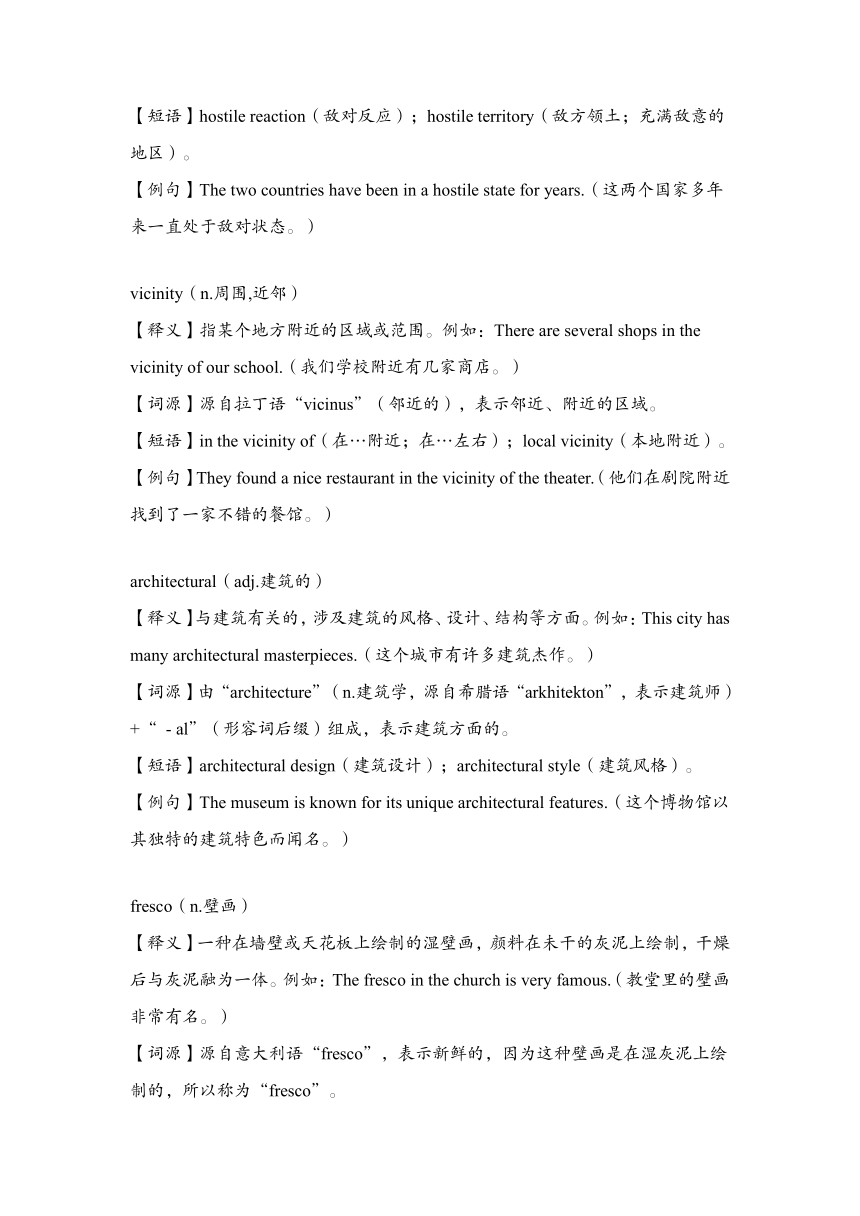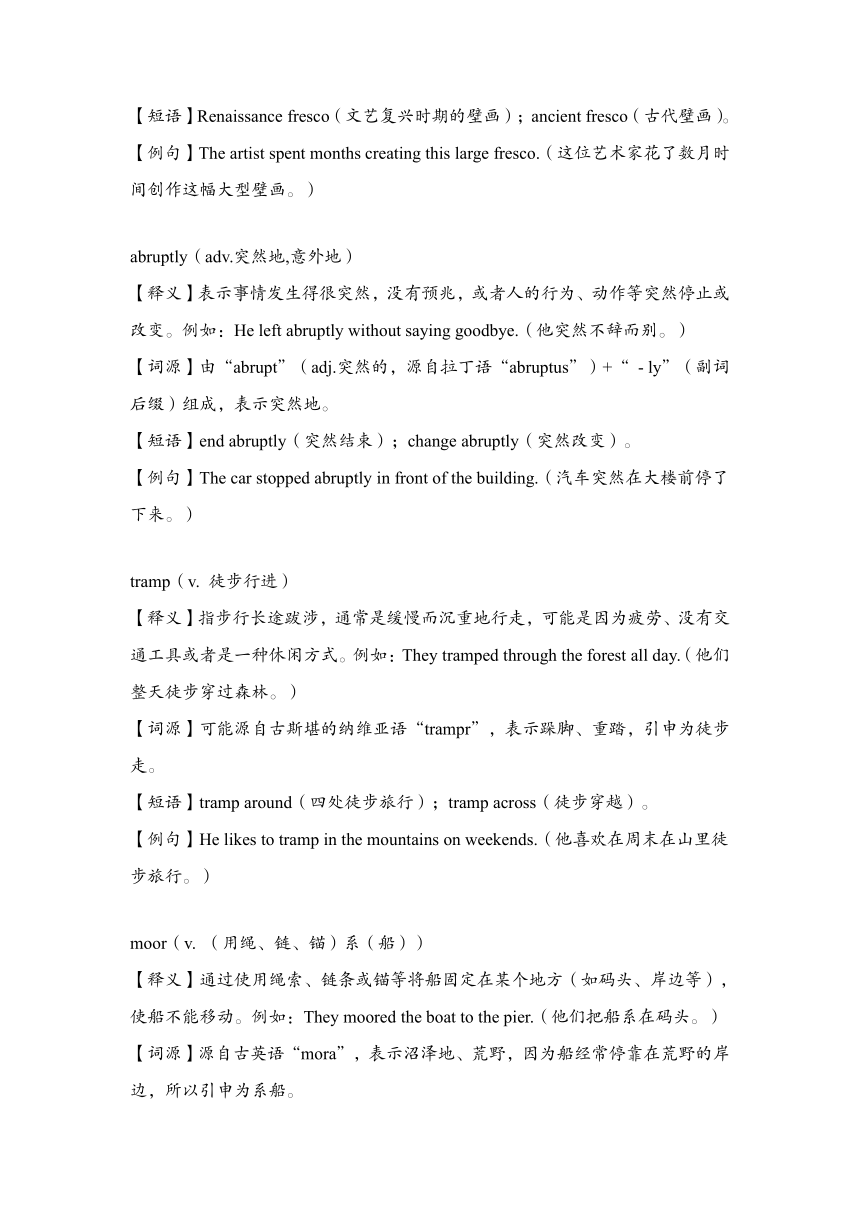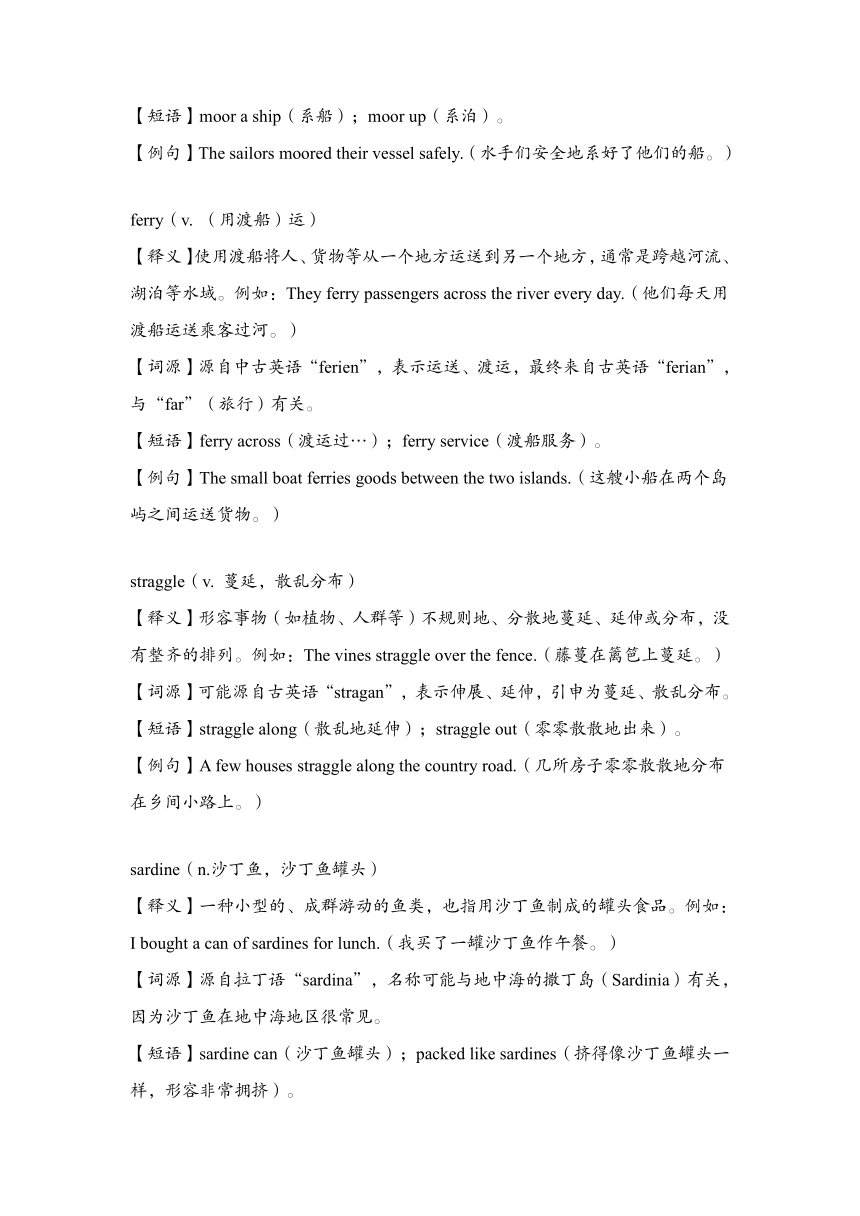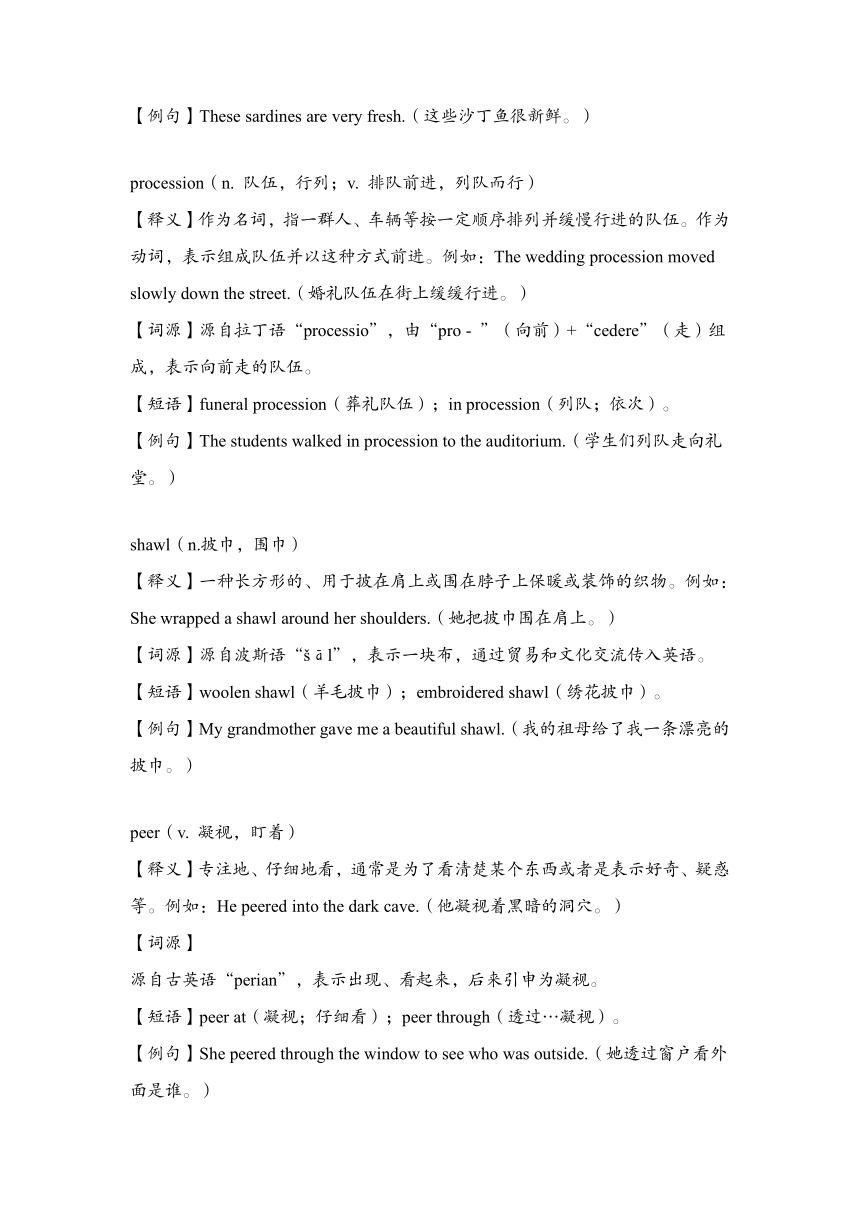新概念第三册 Lesson 48 The silent village 讲义
文档属性
| 名称 | 新概念第三册 Lesson 48 The silent village 讲义 |

|
|
| 格式 | docx | ||
| 文件大小 | 363.8KB | ||
| 资源类型 | 教案 | ||
| 版本资源 | 新概念英语 | ||
| 科目 | 英语 | ||
| 更新时间 | 2024-12-05 11:49:26 | ||
图片预览





文档简介
新概念第三册
Lesson 48 The silent village
单词精讲
inaccessible adj. 难接近的,达不到的
【释义】形容某个地方难以到达,或者某人难以接近、联系,也可表示某些信息、资源等难以获取。例如:The mountain peak is inaccessible without proper climbing equipment.(没有合适的攀登设备,那个山峰是难以到达的。)
【词源】由“in - ”(否定前缀,不)+“accessible”(可接近的,源自拉丁语“accessibilis”)组成,意为不可接近的。
【短语】inaccessible area(难以到达的地区);inaccessible information(难以获取的信息)。
【例句】His office is inaccessible to ordinary people.(普通人难以接近他的办公室。)
hospitable(adj. 好客的)
【释义】用于形容人、地方或文化等对客人热情、友好,乐于接待和款待。例如:The local people are very hospitable to tourists.(当地人对游客非常好客。)
【词源】源自拉丁语“hospes”(客人、主人),加上表示“有…性质的”后缀“ - able”,表示有招待客人的性质,即好客的。
【短语】hospitable host(好客的主人);hospitable environment(适宜居住的环境,有好客氛围的环境)。
【例句】She comes from a very hospitable family.(她来自一个非常好客的家庭。)
hostile(adj.不友好的,有敌意的)
【释义】表示对某人或某事怀有敌意、对抗的态度,或形容环境等是不利的、充满敌意的。例如:His hostile attitude made everyone uncomfortable.(他的敌对态度让每个人都不舒服。)
【词源】源自拉丁语“hostis”(敌人),表示像敌人一样的,即有敌意的。
【短语】hostile reaction(敌对反应);hostile territory(敌方领土;充满敌意的地区)。
【例句】The two countries have been in a hostile state for years.(这两个国家多年来一直处于敌对状态。)
vicinity(n.周围,近邻)
【释义】指某个地方附近的区域或范围。例如:There are several shops in the vicinity of our school.(我们学校附近有几家商店。)
【词源】源自拉丁语“vicinus”(邻近的),表示邻近、附近的区域。
【短语】in the vicinity of(在…附近;在…左右);local vicinity(本地附近)。
【例句】They found a nice restaurant in the vicinity of the theater.(他们在剧院附近找到了一家不错的餐馆。)
architectural(adj.建筑的)
【释义】与建筑有关的,涉及建筑的风格、设计、结构等方面。例如:This city has many architectural masterpieces.(这个城市有许多建筑杰作。)
【词源】由“architecture”(n.建筑学,源自希腊语“arkhitekton”,表示建筑师)+“ - al”(形容词后缀)组成,表示建筑方面的。
【短语】architectural design(建筑设计);architectural style(建筑风格)。
【例句】The museum is known for its unique architectural features.(这个博物馆以其独特的建筑特色而闻名。)
fresco(n.壁画)
【释义】一种在墙壁或天花板上绘制的湿壁画,颜料在未干的灰泥上绘制,干燥后与灰泥融为一体。例如:The fresco in the church is very famous.(教堂里的壁画非常有名。)
【词源】源自意大利语“fresco”,表示新鲜的,因为这种壁画是在湿灰泥上绘制的,所以称为“fresco”。
【短语】Renaissance fresco(文艺复兴时期的壁画);ancient fresco(古代壁画)。
【例句】The artist spent months creating this large fresco.(这位艺术家花了数月时间创作这幅大型壁画。)
abruptly(adv.突然地,意外地)
【释义】表示事情发生得很突然,没有预兆,或者人的行为、动作等突然停止或改变。例如:He left abruptly without saying goodbye.(他突然不辞而别。)
【词源】由“abrupt”(adj.突然的,源自拉丁语“abruptus”)+“ - ly”(副词后缀)组成,表示突然地。
【短语】end abruptly(突然结束);change abruptly(突然改变)。
【例句】The car stopped abruptly in front of the building.(汽车突然在大楼前停了下来。)
tramp(v. 徒步行进)
【释义】指步行长途跋涉,通常是缓慢而沉重地行走,可能是因为疲劳、没有交通工具或者是一种休闲方式。例如:They tramped through the forest all day.(他们整天徒步穿过森林。)
【词源】可能源自古斯堪的纳维亚语“trampr”,表示跺脚、重踏,引申为徒步走。
【短语】tramp around(四处徒步旅行);tramp across(徒步穿越)。
【例句】He likes to tramp in the mountains on weekends.(他喜欢在周末在山里徒步旅行。)
moor(v. (用绳、链、锚)系(船))
【释义】通过使用绳索、链条或锚等将船固定在某个地方(如码头、岸边等),使船不能移动。例如:They moored the boat to the pier.(他们把船系在码头。)
【词源】源自古英语“mora”,表示沼泽地、荒野,因为船经常停靠在荒野的岸边,所以引申为系船。
【短语】moor a ship(系船);moor up(系泊)。
【例句】The sailors moored their vessel safely.(水手们安全地系好了他们的船。)
ferry(v. (用渡船)运)
【释义】使用渡船将人、货物等从一个地方运送到另一个地方,通常是跨越河流、湖泊等水域。例如:They ferry passengers across the river every day.(他们每天用渡船运送乘客过河。)
【词源】源自中古英语“ferien”,表示运送、渡运,最终来自古英语“ferian”,与“far”(旅行)有关。
【短语】ferry across(渡运过…);ferry service(渡船服务)。
【例句】The small boat ferries goods between the two islands.(这艘小船在两个岛屿之间运送货物。)
straggle(v. 蔓延,散乱分布)
【释义】形容事物(如植物、人群等)不规则地、分散地蔓延、延伸或分布,没有整齐的排列。例如:The vines straggle over the fence.(藤蔓在篱笆上蔓延。)
【词源】可能源自古英语“stragan”,表示伸展、延伸,引申为蔓延、散乱分布。
【短语】straggle along(散乱地延伸);straggle out(零零散散地出来)。
【例句】A few houses straggle along the country road.(几所房子零零散散地分布在乡间小路上。)
sardine(n.沙丁鱼,沙丁鱼罐头)
【释义】一种小型的、成群游动的鱼类,也指用沙丁鱼制成的罐头食品。例如:I bought a can of sardines for lunch.(我买了一罐沙丁鱼作午餐。)
【词源】源自拉丁语“sardina”,名称可能与地中海的撒丁岛(Sardinia)有关,因为沙丁鱼在地中海地区很常见。
【短语】sardine can(沙丁鱼罐头);packed like sardines(挤得像沙丁鱼罐头一样,形容非常拥挤)。
【例句】These sardines are very fresh.(这些沙丁鱼很新鲜。)
procession(n. 队伍,行列;v. 排队前进,列队而行)
【释义】作为名词,指一群人、车辆等按一定顺序排列并缓慢行进的队伍。作为动词,表示组成队伍并以这种方式前进。例如:The wedding procession moved slowly down the street.(婚礼队伍在街上缓缓行进。)
【词源】源自拉丁语“processio”,由“pro - ”(向前)+“cedere”(走)组成,表示向前走的队伍。
【短语】funeral procession(葬礼队伍);in procession(列队;依次)。
【例句】The students walked in procession to the auditorium.(学生们列队走向礼堂。)
shawl(n.披巾,围巾)
【释义】一种长方形的、用于披在肩上或围在脖子上保暖或装饰的织物。例如:She wrapped a shawl around her shoulders.(她把披巾围在肩上。)
【词源】源自波斯语“ āl”,表示一块布,通过贸易和文化交流传入英语。
【短语】woolen shawl(羊毛披巾);embroidered shawl(绣花披巾)。
【例句】My grandmother gave me a beautiful shawl.(我的祖母给了我一条漂亮的披巾。)
peer(v. 凝视,盯着)
【释义】专注地、仔细地看,通常是为了看清楚某个东西或者是表示好奇、疑惑等。例如:He peered into the dark cave.(他凝视着黑暗的洞穴。)
【词源】
源自古英语“perian”,表示出现、看起来,后来引申为凝视。
【短语】peer at(凝视;仔细看);peer through(透过…凝视)。
【例句】She peered through the window to see who was outside.(她透过窗户看外面是谁。)
quicken(v.加快)
【释义】使速度、节奏、进程等变得更快。例如:We need to quicken our pace to catch the bus.(我们需要加快步伐去赶公共汽车。)
【词源】由“quick”(adj.快的,源自古英语“cwicu”)+“ - en”(使动后缀)组成,表示使变快。
【短语】quicken up(加快速度);quicken the pace(加快步伐)。
【例句】The new policy will quicken the economic development.(新政策将加快经济发展。)
二、课文精讲
1.In this much-travelled world, there are still thousands of places which are inaccessible to tourists.在这个旅游频繁的世界上,仍有成千上万个游人足迹未至的地方。
much-travelled world为“复合形容词+n.”结构的短语,不能说busy world,busy指的是“事情多”。
2.We always assume that villagers in remote places are friendly and hospitable.人们总是以为偏僻的地方的村民们热情好客。
assume that…的意境比think that…要深的多。
friendly and hospitable作表语。
3.But people who are cut off not only from foreign tourists, but even from their own countrymen can be hostile to travellers.但是,那些不但与外国旅游者隔绝,而且与本国同胞隔绝的人们有可能对游客抱有敌意。
can be hostile to的意思是“可能对…抱有敌意”。
4.We had spent several days in a small town and visited a number of old churches in the vicinity.我们在一座小镇上逗留了几天,参观了附近的许多古老的教堂。
“spend+时间+in/at+地点”是一个固定结构,意思是“在某地度过了多长时间”。
5.These attracted many visitors, for they were not only of great architectural interest, but contained a large number of beautifully preserved frescoes as well.这些教堂吸引大量游客,不仅是因为建筑风格奇特,而且还有大量保存完好的壁画。
preserved frescoes的意思是“保存的壁画”。
6.Taking a path which led out of the town, we crossed a few fields until we came to a dense wood.我们走上了一条出镇的小路,穿过几块农田,来到一片茂密的树林。
lead out of的意思是“领出,指引走出”。
7.We expected the path to end abruptly, but we found that it traced its way through the trees.我们原以为小路会到此突然终止。没想到它到树林中继续向前延伸。
trace its way的意思是“杀出一条路”。
8.We could see that the path continued on the other side, but we had no idea how we could get across the stream.我们可以看到小路在深溪对岸继续向前伸展,但却不知如何越过这道深溪。
continue on在此引申为“伸展”。
how can sb.get across的意思是“某人如何越过”。
9.Suddenly my wife spotted a boat moored to the bank.突然,妻子发现岸边泊着一条小船。
sopt的意思是“认出,发现”。
10.We gently woke him up and asked him to ferry us to the other side.我们轻轻地把他唤醒,请他把我们摆渡过溪。
ferry sb.to的意思是“(用船)把某人渡到(某地)。”
11.Though he was reluctant to do so at first, we eventually persuaded him to take us.一开始,他很不愿意,但经劝说,终于同意了。
be reluctant to do的意思是“不情愿做”。
12.The path led to a tiny village perched on the steep sides of a mountain.顺着小路,我们来到一个座落在陡峭山坡上的小村庄。
perch on的意思是“坐落在…”。
13.The village seemed deserted, the only sign of life being an ugly-looking black goat on a short length of rope tied to a tree in a field nearby.村里似乎无人居住,唯一的生命迹象是附近田里一只面目可憎的黑山羊,用一截短绳拴在一棵树上。
本句中的the only sign of life being an ugly—looking black goat on a short length of rope tied to a tree in a field nearby是独立主格结构。
14.All at once, I noticed that my wife seemed to be filled with alarm.突然,我注意到妻子十分惊恐。
be filled with alarm的意思是“充满恐慌”。
15.Looking up I saw that we were surrounded by children in rags who were looking at us silently as we ate.我抬头一看,发现我们被一群衣衫褴褛的小孩团团围住了,他们在默不作声地看着我们吃饭。
be surrounded by的意思是“被…包围”。
16.I concluded that they were simply shy of strangers.我认为这不过是他们在陌生人面前表现出的害羞。
注意,conclude和assume后面都可以接宾语从句,意思是“认为”。
17.The village which had seemed deserted, immediately came to life.刚才还似乎空荡荡的村庄一下子活跃了起来。
come to life的本意是“苏醒”,在此引申为“活跃”。
18.Men in shirt sleeves stood outside their houses and glared at us.只穿着衬衣的男人们站在屋子外面凶狠地盯着我们。
glare的意思是“怒视”。
19.Old women in black shawls peered at us from doorways.披黑纱巾的老妇人站在门口偷偷地瞅着我们。
peer at的意思是“凝视”。
20.The most frightening thing of all was that not a sound could be heard.最令人害怕的是到处没有一点声音。
can be heard的意思是“可以被听到。”
21.There was no doubt that we were unwelcome visitors.毫无疑问,我们的来访是不受欢迎的。
there is/was no doubt that…相当于it is/was needless to say…。
22.We needed no further warning.我们不需要进一步的警告了。
need no相当于do not need。
Lesson 48 The silent village
单词精讲
inaccessible adj. 难接近的,达不到的
【释义】形容某个地方难以到达,或者某人难以接近、联系,也可表示某些信息、资源等难以获取。例如:The mountain peak is inaccessible without proper climbing equipment.(没有合适的攀登设备,那个山峰是难以到达的。)
【词源】由“in - ”(否定前缀,不)+“accessible”(可接近的,源自拉丁语“accessibilis”)组成,意为不可接近的。
【短语】inaccessible area(难以到达的地区);inaccessible information(难以获取的信息)。
【例句】His office is inaccessible to ordinary people.(普通人难以接近他的办公室。)
hospitable(adj. 好客的)
【释义】用于形容人、地方或文化等对客人热情、友好,乐于接待和款待。例如:The local people are very hospitable to tourists.(当地人对游客非常好客。)
【词源】源自拉丁语“hospes”(客人、主人),加上表示“有…性质的”后缀“ - able”,表示有招待客人的性质,即好客的。
【短语】hospitable host(好客的主人);hospitable environment(适宜居住的环境,有好客氛围的环境)。
【例句】She comes from a very hospitable family.(她来自一个非常好客的家庭。)
hostile(adj.不友好的,有敌意的)
【释义】表示对某人或某事怀有敌意、对抗的态度,或形容环境等是不利的、充满敌意的。例如:His hostile attitude made everyone uncomfortable.(他的敌对态度让每个人都不舒服。)
【词源】源自拉丁语“hostis”(敌人),表示像敌人一样的,即有敌意的。
【短语】hostile reaction(敌对反应);hostile territory(敌方领土;充满敌意的地区)。
【例句】The two countries have been in a hostile state for years.(这两个国家多年来一直处于敌对状态。)
vicinity(n.周围,近邻)
【释义】指某个地方附近的区域或范围。例如:There are several shops in the vicinity of our school.(我们学校附近有几家商店。)
【词源】源自拉丁语“vicinus”(邻近的),表示邻近、附近的区域。
【短语】in the vicinity of(在…附近;在…左右);local vicinity(本地附近)。
【例句】They found a nice restaurant in the vicinity of the theater.(他们在剧院附近找到了一家不错的餐馆。)
architectural(adj.建筑的)
【释义】与建筑有关的,涉及建筑的风格、设计、结构等方面。例如:This city has many architectural masterpieces.(这个城市有许多建筑杰作。)
【词源】由“architecture”(n.建筑学,源自希腊语“arkhitekton”,表示建筑师)+“ - al”(形容词后缀)组成,表示建筑方面的。
【短语】architectural design(建筑设计);architectural style(建筑风格)。
【例句】The museum is known for its unique architectural features.(这个博物馆以其独特的建筑特色而闻名。)
fresco(n.壁画)
【释义】一种在墙壁或天花板上绘制的湿壁画,颜料在未干的灰泥上绘制,干燥后与灰泥融为一体。例如:The fresco in the church is very famous.(教堂里的壁画非常有名。)
【词源】源自意大利语“fresco”,表示新鲜的,因为这种壁画是在湿灰泥上绘制的,所以称为“fresco”。
【短语】Renaissance fresco(文艺复兴时期的壁画);ancient fresco(古代壁画)。
【例句】The artist spent months creating this large fresco.(这位艺术家花了数月时间创作这幅大型壁画。)
abruptly(adv.突然地,意外地)
【释义】表示事情发生得很突然,没有预兆,或者人的行为、动作等突然停止或改变。例如:He left abruptly without saying goodbye.(他突然不辞而别。)
【词源】由“abrupt”(adj.突然的,源自拉丁语“abruptus”)+“ - ly”(副词后缀)组成,表示突然地。
【短语】end abruptly(突然结束);change abruptly(突然改变)。
【例句】The car stopped abruptly in front of the building.(汽车突然在大楼前停了下来。)
tramp(v. 徒步行进)
【释义】指步行长途跋涉,通常是缓慢而沉重地行走,可能是因为疲劳、没有交通工具或者是一种休闲方式。例如:They tramped through the forest all day.(他们整天徒步穿过森林。)
【词源】可能源自古斯堪的纳维亚语“trampr”,表示跺脚、重踏,引申为徒步走。
【短语】tramp around(四处徒步旅行);tramp across(徒步穿越)。
【例句】He likes to tramp in the mountains on weekends.(他喜欢在周末在山里徒步旅行。)
moor(v. (用绳、链、锚)系(船))
【释义】通过使用绳索、链条或锚等将船固定在某个地方(如码头、岸边等),使船不能移动。例如:They moored the boat to the pier.(他们把船系在码头。)
【词源】源自古英语“mora”,表示沼泽地、荒野,因为船经常停靠在荒野的岸边,所以引申为系船。
【短语】moor a ship(系船);moor up(系泊)。
【例句】The sailors moored their vessel safely.(水手们安全地系好了他们的船。)
ferry(v. (用渡船)运)
【释义】使用渡船将人、货物等从一个地方运送到另一个地方,通常是跨越河流、湖泊等水域。例如:They ferry passengers across the river every day.(他们每天用渡船运送乘客过河。)
【词源】源自中古英语“ferien”,表示运送、渡运,最终来自古英语“ferian”,与“far”(旅行)有关。
【短语】ferry across(渡运过…);ferry service(渡船服务)。
【例句】The small boat ferries goods between the two islands.(这艘小船在两个岛屿之间运送货物。)
straggle(v. 蔓延,散乱分布)
【释义】形容事物(如植物、人群等)不规则地、分散地蔓延、延伸或分布,没有整齐的排列。例如:The vines straggle over the fence.(藤蔓在篱笆上蔓延。)
【词源】可能源自古英语“stragan”,表示伸展、延伸,引申为蔓延、散乱分布。
【短语】straggle along(散乱地延伸);straggle out(零零散散地出来)。
【例句】A few houses straggle along the country road.(几所房子零零散散地分布在乡间小路上。)
sardine(n.沙丁鱼,沙丁鱼罐头)
【释义】一种小型的、成群游动的鱼类,也指用沙丁鱼制成的罐头食品。例如:I bought a can of sardines for lunch.(我买了一罐沙丁鱼作午餐。)
【词源】源自拉丁语“sardina”,名称可能与地中海的撒丁岛(Sardinia)有关,因为沙丁鱼在地中海地区很常见。
【短语】sardine can(沙丁鱼罐头);packed like sardines(挤得像沙丁鱼罐头一样,形容非常拥挤)。
【例句】These sardines are very fresh.(这些沙丁鱼很新鲜。)
procession(n. 队伍,行列;v. 排队前进,列队而行)
【释义】作为名词,指一群人、车辆等按一定顺序排列并缓慢行进的队伍。作为动词,表示组成队伍并以这种方式前进。例如:The wedding procession moved slowly down the street.(婚礼队伍在街上缓缓行进。)
【词源】源自拉丁语“processio”,由“pro - ”(向前)+“cedere”(走)组成,表示向前走的队伍。
【短语】funeral procession(葬礼队伍);in procession(列队;依次)。
【例句】The students walked in procession to the auditorium.(学生们列队走向礼堂。)
shawl(n.披巾,围巾)
【释义】一种长方形的、用于披在肩上或围在脖子上保暖或装饰的织物。例如:She wrapped a shawl around her shoulders.(她把披巾围在肩上。)
【词源】源自波斯语“ āl”,表示一块布,通过贸易和文化交流传入英语。
【短语】woolen shawl(羊毛披巾);embroidered shawl(绣花披巾)。
【例句】My grandmother gave me a beautiful shawl.(我的祖母给了我一条漂亮的披巾。)
peer(v. 凝视,盯着)
【释义】专注地、仔细地看,通常是为了看清楚某个东西或者是表示好奇、疑惑等。例如:He peered into the dark cave.(他凝视着黑暗的洞穴。)
【词源】
源自古英语“perian”,表示出现、看起来,后来引申为凝视。
【短语】peer at(凝视;仔细看);peer through(透过…凝视)。
【例句】She peered through the window to see who was outside.(她透过窗户看外面是谁。)
quicken(v.加快)
【释义】使速度、节奏、进程等变得更快。例如:We need to quicken our pace to catch the bus.(我们需要加快步伐去赶公共汽车。)
【词源】由“quick”(adj.快的,源自古英语“cwicu”)+“ - en”(使动后缀)组成,表示使变快。
【短语】quicken up(加快速度);quicken the pace(加快步伐)。
【例句】The new policy will quicken the economic development.(新政策将加快经济发展。)
二、课文精讲
1.In this much-travelled world, there are still thousands of places which are inaccessible to tourists.在这个旅游频繁的世界上,仍有成千上万个游人足迹未至的地方。
much-travelled world为“复合形容词+n.”结构的短语,不能说busy world,busy指的是“事情多”。
2.We always assume that villagers in remote places are friendly and hospitable.人们总是以为偏僻的地方的村民们热情好客。
assume that…的意境比think that…要深的多。
friendly and hospitable作表语。
3.But people who are cut off not only from foreign tourists, but even from their own countrymen can be hostile to travellers.但是,那些不但与外国旅游者隔绝,而且与本国同胞隔绝的人们有可能对游客抱有敌意。
can be hostile to的意思是“可能对…抱有敌意”。
4.We had spent several days in a small town and visited a number of old churches in the vicinity.我们在一座小镇上逗留了几天,参观了附近的许多古老的教堂。
“spend+时间+in/at+地点”是一个固定结构,意思是“在某地度过了多长时间”。
5.These attracted many visitors, for they were not only of great architectural interest, but contained a large number of beautifully preserved frescoes as well.这些教堂吸引大量游客,不仅是因为建筑风格奇特,而且还有大量保存完好的壁画。
preserved frescoes的意思是“保存的壁画”。
6.Taking a path which led out of the town, we crossed a few fields until we came to a dense wood.我们走上了一条出镇的小路,穿过几块农田,来到一片茂密的树林。
lead out of的意思是“领出,指引走出”。
7.We expected the path to end abruptly, but we found that it traced its way through the trees.我们原以为小路会到此突然终止。没想到它到树林中继续向前延伸。
trace its way的意思是“杀出一条路”。
8.We could see that the path continued on the other side, but we had no idea how we could get across the stream.我们可以看到小路在深溪对岸继续向前伸展,但却不知如何越过这道深溪。
continue on在此引申为“伸展”。
how can sb.get across的意思是“某人如何越过”。
9.Suddenly my wife spotted a boat moored to the bank.突然,妻子发现岸边泊着一条小船。
sopt的意思是“认出,发现”。
10.We gently woke him up and asked him to ferry us to the other side.我们轻轻地把他唤醒,请他把我们摆渡过溪。
ferry sb.to的意思是“(用船)把某人渡到(某地)。”
11.Though he was reluctant to do so at first, we eventually persuaded him to take us.一开始,他很不愿意,但经劝说,终于同意了。
be reluctant to do的意思是“不情愿做”。
12.The path led to a tiny village perched on the steep sides of a mountain.顺着小路,我们来到一个座落在陡峭山坡上的小村庄。
perch on的意思是“坐落在…”。
13.The village seemed deserted, the only sign of life being an ugly-looking black goat on a short length of rope tied to a tree in a field nearby.村里似乎无人居住,唯一的生命迹象是附近田里一只面目可憎的黑山羊,用一截短绳拴在一棵树上。
本句中的the only sign of life being an ugly—looking black goat on a short length of rope tied to a tree in a field nearby是独立主格结构。
14.All at once, I noticed that my wife seemed to be filled with alarm.突然,我注意到妻子十分惊恐。
be filled with alarm的意思是“充满恐慌”。
15.Looking up I saw that we were surrounded by children in rags who were looking at us silently as we ate.我抬头一看,发现我们被一群衣衫褴褛的小孩团团围住了,他们在默不作声地看着我们吃饭。
be surrounded by的意思是“被…包围”。
16.I concluded that they were simply shy of strangers.我认为这不过是他们在陌生人面前表现出的害羞。
注意,conclude和assume后面都可以接宾语从句,意思是“认为”。
17.The village which had seemed deserted, immediately came to life.刚才还似乎空荡荡的村庄一下子活跃了起来。
come to life的本意是“苏醒”,在此引申为“活跃”。
18.Men in shirt sleeves stood outside their houses and glared at us.只穿着衬衣的男人们站在屋子外面凶狠地盯着我们。
glare的意思是“怒视”。
19.Old women in black shawls peered at us from doorways.披黑纱巾的老妇人站在门口偷偷地瞅着我们。
peer at的意思是“凝视”。
20.The most frightening thing of all was that not a sound could be heard.最令人害怕的是到处没有一点声音。
can be heard的意思是“可以被听到。”
21.There was no doubt that we were unwelcome visitors.毫无疑问,我们的来访是不受欢迎的。
there is/was no doubt that…相当于it is/was needless to say…。
22.We needed no further warning.我们不需要进一步的警告了。
need no相当于do not need。
同课章节目录
